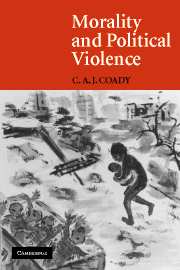Book contents
- Frontmatter
- Contents
- Preface
- Morality and Political Violence
- 1 Staring at Armageddon
- 2 The Idea of Violence
- 3 Violence and Justice
- 4 Aggression, Defence, and Just Cause
- 5 Justice with Prudence
- 6 The Right Way to Fight
- 7 The Problem of Collateral Damage
- 8 The Morality of Terrorism
- 9 The Immunities of Combatants
- 10 Morality and the Mercenary Warrior
- 11 Objecting Morally
- 12 Weapons of Mass Destruction
- 13 The Ideal of Peace
- 14 The Issue of Stringency
- Bibliography
- Index
2 - The Idea of Violence
Published online by Cambridge University Press: 05 June 2012
- Frontmatter
- Contents
- Preface
- Morality and Political Violence
- 1 Staring at Armageddon
- 2 The Idea of Violence
- 3 Violence and Justice
- 4 Aggression, Defence, and Just Cause
- 5 Justice with Prudence
- 6 The Right Way to Fight
- 7 The Problem of Collateral Damage
- 8 The Morality of Terrorism
- 9 The Immunities of Combatants
- 10 Morality and the Mercenary Warrior
- 11 Objecting Morally
- 12 Weapons of Mass Destruction
- 13 The Ideal of Peace
- 14 The Issue of Stringency
- Bibliography
- Index
Summary
And the soldiers likewise demanded of him, saying, And what shall we do? And he said unto them, Do violence to no man, neither accuse any falsely; and be content with your wages.
Luke 3:14, King James VersionHannah Arendt once complained that the careless use in political theory of such key terms as “power,” “strength,” “force,” “authority,” and “violence” indicated not only a deplorable deafness to linguistic meanings but also a kind of blindness to significant political realities. The blame for this she traced to the obsession with reducing public affairs to “the business of dominion.” I share her belief that conceptual carelessness or misunderstanding about such ideas as violence has political importance, and I suspect that she may be right in her diagnosis of what lies behind a good deal of such confusion. My present concern, however, is rather different from that specifically addressed by Arendt, although the two are related. Nowadays it is not so much that theorists are, as Arendt objected, indifferent to distinctions between the key terms listed but that they offer explicit definitions of the term “violence” that exhibit both the deafness to linguistic patterns and, more significantly, the blindness to political and moral realities of which she complained. In what follows, I shall try to support this claim by examining several fashionable definitions of violence with an eye to both their conceptual adequacy and their moral and social implications.
- Type
- Chapter
- Information
- Morality and Political Violence , pp. 21 - 42Publisher: Cambridge University PressPrint publication year: 2007



